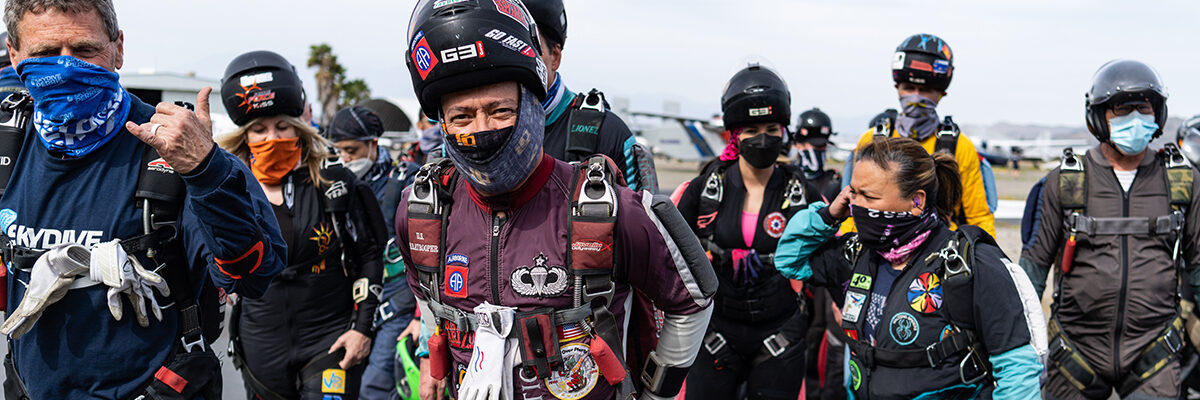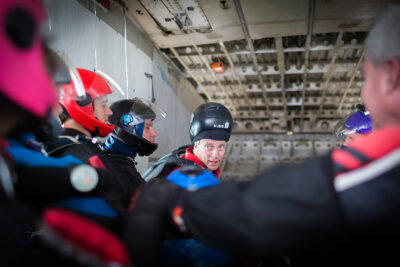How experienced jumpers can help new skydivers
Monday, January 31, 2022

- Christy Frikken
- 1/31/22
- 0
- General, Safety
The best part of the sport is how much people love sharing and helping each other. We all take care of each other, and everyone wants to share what they know.
But some folks might be shy about helping; others might not recognize how they can best contribute. So here is my advice for how you can share your knowledge with others in the most effective, welcome, and helpful way.
Permission
First, make sure your advice is welcome. Even if you have the best advice in the world and are 100% correct and on point, it is not good if the person hearing it doesn’t want it.
There can be a lot of reasons for not wanting advice. The most common is information overwhelm, the perception of conflicting information, or they just haven’t built a trust relationship with you. It is all good; let them know they can approach you when they are ready.
The exception being, of course, gross safety issues. If someone is behaving in a way that will immediately physically hurt them, act now. If it is a longer-term risk choice, discuss it with your dropzone authority. If that doesn’t work, well, it is unlikely that yelling or berating will be effective at that point. Approach the person with love and concern.
Good advice, safe advice
When helping out new jumpers, make sure your suggestions are correct. If you are going to share stuff, make sure you aren’t propagating myths.
That doesn’t mean you need to be a professional coach with years of experience. But do your best to keep up on the best techniques.
It also means that you should be cautious about sharing advice if you are inexperienced with the activity. It might be ok to repeat something you have heard from an expert – like a tip. But the danger here is context and blurring of information that can get passed to students.
Above all, make sure your advice is safe. That is non-negotiable. If you aren’t sure, maybe this is an excellent time to clarify it yourself.
About them, not you
When you are helping someone, it is about them, not you. Bad coaches used their student’s wind tunnel time to show off, mess around, and work their own tricks. If you are helping someone, it is about whatever gets them good, not showing off what you know.

Share experiences
Sharing your experiences is an easy and great way to help. Instead of advice, it is powerful to share your story. If someone is struggling or having an emotional experience, connecting with them and letting them know you felt the same way could be very helpful. And framing things in a story is a palatable and memorable way to help.
For example, if someone has a bad day at the big way camp, you could give them tons of tips. But what will probably work better is the story of how you had a bad series of jumps once too. Then, you can relate how you overcame the negative feelings by focusing on slight improvements, calming down, or talking with someone.
Not everyone has tons of technical information, but every human has had emotions and experiences. So no matter what level you are at, you are fully qualified to talk about how you dealt with challenging situations.
Less is more
The most significant difference between a new coach and a veteran one is how much information they present. When you are just starting, it is tempting to use the shotgun approach to coaching. In part, this is to establish your authority if you don’t feel super confident. The other part is that you aren’t sure what works, so throwing it all on the wall and seeing what sticks is the plan.
To be more helpful, choose smaller and more targeted pieces of advice. Most folks can nail one or two significant goals in a skydive. Throwing on layers of detail and extra words distract and reduce the overall chances of success. Plus, the student will feel like they fail if they have 100 goals. Incremental improvements are where it is at.

Watch your phrasing
Before you say a thing, consider how it will be misinterpreted. Every coach has a dozen stories of students interpreting literal phrases … well, literally. If you say, “take this arm on exit,” don’t neglect to mention they should also keep holding on to the bar… or you’ll be holding on for dear life as they put both their arms and all their weight on you.
You can be concrete instead of abstract. Instead of saying “go way over there”, show your student precisely what “over there is”. Instead of saying go fast, show them by walking the speed that you mean.
Timing is everything
If the person has been bombarded and is overwhelmed intellectually or emotionally, give them some space. Then, help when they are ready.
If you are on the plane at 12000’, this isn’t the time for a detailed explanation of a new thing. Also, please don’t talk in the dirt dive when they are listening to the coach.
Exude calm
Everyone can do this! One of the most memorable competition experiences I had was in the 2005 Nationals. My advanced team was super lucky and scored Shannon Pilcher as a player-coach. I remember very distinctly being on the plane and noticing how the energy of the other flyers was edgy and tense. Except Shannon was exuding calm like a beacon. Just being near him made me calm, and I realized how not calm I was before.
Most skydivers are too hyped up most of the time. Our sport relies on calm heads to make wise decisions. You can give people that vibe by being that beacon of zen.
Say you don’t know
The mark of confidence is saying you don’t know. But, after twenty years and 16000 skydives, it humbles me how little I know about certain aspects of the sport. And I’m not afraid to admit it. So I happily say, “I don’t know the answer to that, but I would love to help you find out so that I can learn too!”
Encourage and compliment
Everyone likes to attention for good things and stuff they are doing well. Never be shy about telling someone they are doing something right. It feels great to be seen and shines confidence on people. Spread that love!

If you want to help another jumper, that is wonderful. Do it best by making sure your advice is safe, correct, well-timed, carefully phrased, and welcome. If you aren’t sure how to help, share a story, give a compliment, exude calm, and admit what you don’t know. Go forth and continue to make the sport special and inclusive!
Tags: learning




